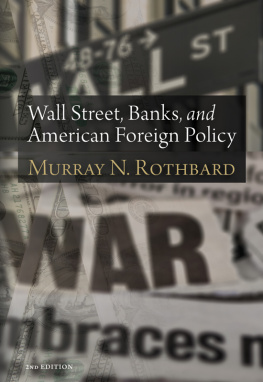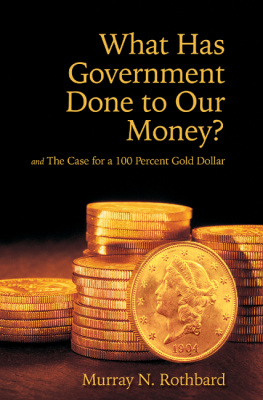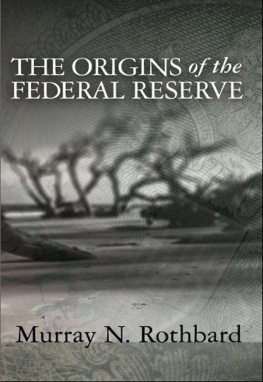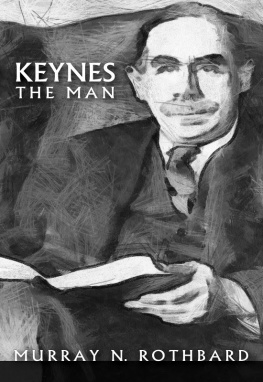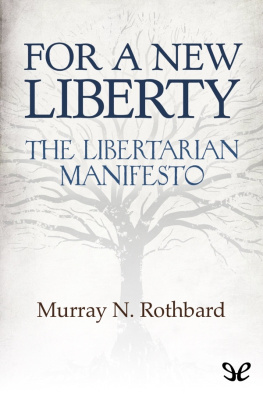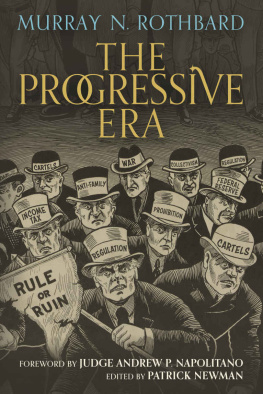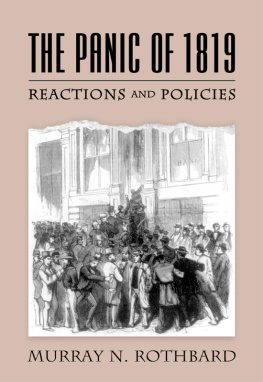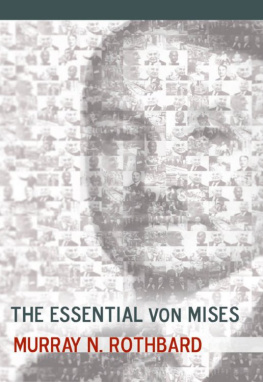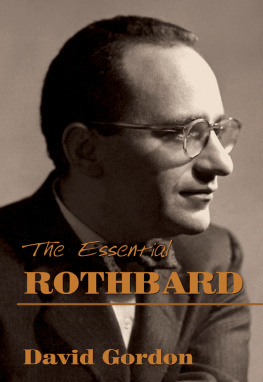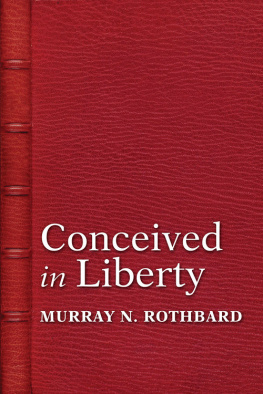WALL STREET, BANKS, AND
AMERICAN FOREIGN POLICY
WALL STREET, BANKS, AND
AMERICAN FOREIGN POLICY
SECOND EDITION
BY
MURRAY N. ROTHBARD
WITH INTRODUCTIONS BY
ANTHONY GREGORY AND JUSTIN RAIMONDO
First appeared in World Market Perspective (1984) and later
under the same title as a monograph produced by the
Center for Libertarian Studies (1995)

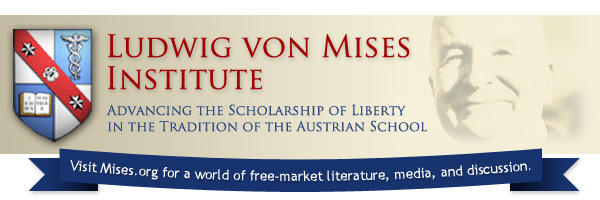
Copyright 2011 by the Ludwig von Mises Institute
Published under the Creative Commons Attribution License 3.0.
http://creativecommons.org/licenses/by/3.0/
Ludwig von Mises Institute
518 West Magnolia Avenue
Auburn, Alabama 36832
mises.org
ISBN: 978-1-61016-192-3
Contents

Introduction to the 2011 Edition
By Anthony Gregory

The idea that corporate interests, banking elites and politicians conspire to set U.S. policy is at once obvious and beyond the pale. Everyone knows that the military-industrial complex is fat and corrupt, that presidents bestow money and privilege on their donors and favored businesses, that a revolving door connects Wall Street and the White House, that economic motivations lurk behind Americas wars. But to make too fine a point of this is typically dismissed as unserious conspiracy theorizing, unworthy of mainstream consideration.
We have seen this paradox at work in the aftermath of the 2008 financial collapse. The left-liberals blame Wall Street and Big Finance for betraying the masses out of predatory greed and for being rewarded for their irresponsibility by Washingtons bailouts. At the same time, the left appears reluctant to oppose these bailouts outright, seeing the spending as a necessary evil to return the global economy to stability, however inequitably. Whats more, left-liberals fail to call out President Obama and Democratic leaders for their undeniable hand in all this. They blame Goldman-Sachs but see their president, who got more campaign money from the firm than from almost any other source, as a helpless victim of circumstance, rather than an energetic conspirator in corporate malfeasance on top of being the enthusiastic heir and expansionist of George W. Bushs aggressive foreign policy.
The Tea Party right is also hesitant to examine the corporate state too closely. These conservatives detect an elitism in Obamas governance but are loath to earnestly challenge the economic status quo, for it would lead to uncomfortable questions about the warfare state, defense contractors, U.S. wars, the whole history of the Republican Party, and all the typical rightwing assumptions about the inherent fairness of Americas supposedly free enterprise system. By refusing to admit that economic fundamentals were unsound through the entirety of the Bush yearsby failing to acknowledge the imperial reality of U.S. wars and their debilitating effect on the average household budgetthe right is forgoing its chance to delve beyond the surface in its criticism of Obamas reign.
Many on the right call Obama a socialist as many on the left accused Bush of being a fascist, neither group seeing the stark similarities in almost all of their policies. Meanwhile, the more mainstream forces on both left and right refuse to countenance such extremist rhetoric and insist that both political parties, for all their differences, have the best of Americas interests at heart. In the lefts unflinching loyalty to social democracy and economic intervention and the rights invincible love for the military and support for corporate America we see why we are allowed to decry corruption and special interests, but not dig too much deeper than that, lest we be relegated to the periphery of respectable discussion.
Never afraid to slaughter sacred cows, Murray N. Rothbard goes far beyond the mainstream lamentations in his trenchant Wall Street, Banks, and American Foreign Policy. He analyzes over a century of U.S. militarism and corporate cronyism, naming names, sparing no one, and demonstrating the continuity of imperialism regardless of the party in control, alongside the many overlapping and competing business interests behind the curtains. Rothbards account of the clash between the Morgans and Rockefellers, who had some interests in common and some in conflict, brilliantly hones in on the complexity of the story while also explaining generally the dynamics of power. The discussion of the Cowboy firms of the West (and their representatives in Washington) vs. the Yankee Northeastern Establishment is similarly illuminating: While both groups favor the Cold War, the Cowboys are more nationalistic, more hawkish, and less inclined to worry about what our European allies are thinking. It should be clear that the name of the political party in power is far less important than the particular regimes financial and banking connections.
This fantastic written work is the definitive answer to many naysayersthose who boast great differences between Republicans and Democrats; those who insist the main engine behind U.S. wars is concern for national defense or human rights abroad; those who dismiss conspiracy theorizing as oversimplified accusations of behind-the-scenes power-broking, devoid of nuance and sophistication; and those who myopically think all major decisions are made by the exact same clique of major players, rather than through a complicated confluence of sundry interests and forces.
Peddlers of oversimplified conspiracy theories will be uncomfortable with the level of detail in this book, as will the court intellectuals who regard any and all references to the duplicity of groups like the Council on Foreign Relations and the Trilateral Commission as the talk of paranoids completely divorced from reality. Furthermore, people who think that the elimination of corporate influence from the public sphere will finally end the wars and graft will be encouraged to rethink their assumptions about the state: it is not, after all, an organization for the public good that has been hijacked by the rich and powerful, nor an engine of corporate control that can be reformed toward liberal ends. The state itself is and always will be the problem, and so long as it has a military arm, it will be influenced by some private interests or others toward opportunistic warring, and at a minimum manipulated by politicians, even the most supposedly humanitarian and egalitarian of whom have a murderous and diabolical record in deploying its forces and dropping its bombs. Even large business interests can come and go, but the political apparatus itself, the most inherently corrupting of all institutions given its unavoidably coercive and monopolistic nature, will continue to inflict misery and loot the disadvantaged on behalf of the powerful.
On the other hand, unlike moderate libertarians who regard businessmen conspiring with government to be at worst mere accessories to political crime made inevitable by the mixed economy, Rothbard does not temper his indictment of these junior members of the public-private partnerships of imperialist plunder. Free will exists under the Rothbardian conception of both political and economic theory, and if theres blame to go around, the bankers, lobbying CEOs, and saber-rattling policy wonks deserve a considerable share along with the generals and presidents.
Next page
